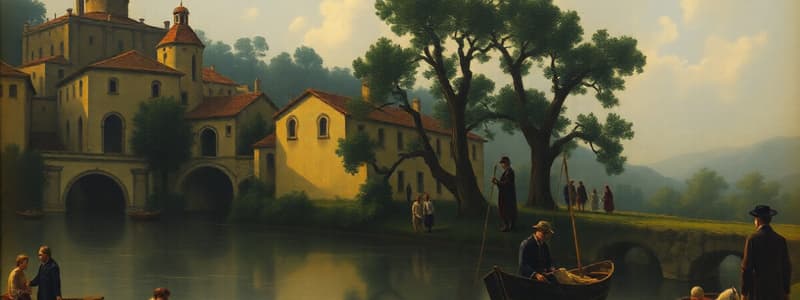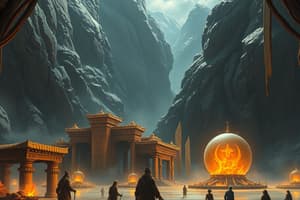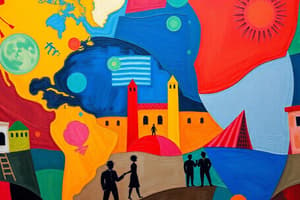Podcast
Questions and Answers
What characterizes civilizations in historical study?
What characterizes civilizations in historical study?
- Complex societies with urban development (correct)
- Isolation from neighboring societies
- Simplicity in social structures
- Nomadic lifestyles predominating
Which period is characterized by feudalism and the rise of monarchies?
Which period is characterized by feudalism and the rise of monarchies?
- Early Modern Period
- Medieval History (correct)
- Ancient History
- Prehistoric Era
What significant change occurred during the Early Modern Period?
What significant change occurred during the Early Modern Period?
- The rise of exploration and scientific advancements (correct)
- The decline of written language
- The end of urbanization
- The fall of all monarchies
Which event marked the end of the Cold War?
Which event marked the end of the Cold War?
Who is known for leading the Indian independence movement through nonviolent means?
Who is known for leading the Indian independence movement through nonviolent means?
Which of the following best describes historiography?
Which of the following best describes historiography?
Which item is a primary source in historical research?
Which item is a primary source in historical research?
What theme in history focuses on trade routes and economic systems?
What theme in history focuses on trade routes and economic systems?
Flashcards are hidden until you start studying
Study Notes
Overview of History
- Study of past events, societies, and civilizations.
- Helps understand the present and predict future trends.
Major Eras in History
-
Prehistoric Era
- Time before written records.
- Archaeological evidence (tools, art).
-
Ancient History
- Cultures such as Mesopotamia, Egypt, Greece, and Rome.
- Development of writing, agriculture, and urbanization.
-
Medieval History
- Fall of the Roman Empire to the Renaissance.
- Feudalism, the rise of monarchies, and the spread of religions.
-
Early Modern Period
- Renaissance to the French Revolution.
- Exploration, scientific advancements, and the Reformation.
-
Modern History
- Industrial Revolution to present day.
- Global conflicts (WWI, WWII), social movements, and technological progress.
Key Concepts in History
- Civilization: Complex societies with urban development, social stratification, and cultural shared practices.
- Historical Method: Process of critically examining sources, artifacts, and primary/secondary documents.
- Historiography: Study of how history is written and interpreted by historians.
Important Historical Figures
- Alexander the Great: Military leader and king who created one of the largest empires in ancient history.
- Julius Caesar: Roman general and statesman, pivotal in the rise of the Roman Empire.
- Charlemagne: King of the Franks who united much of Europe during the early Middle Ages.
- Mahatma Gandhi: Leader of the Indian independence movement through nonviolent civil disobedience.
Significant Historical Events
- Fall of the Berlin Wall (1989): Symbolized the end of the Cold War and the division of East and West Germany.
- American Revolution (1775-1783): Thirteen colonies gained independence from British rule.
- World War II (1939-1945): Global conflict that reshaped international relations and led to the establishment of the United Nations.
Themes in History
- Power and Governance: Dynamics of leadership, authority, and statecraft.
- Economics and Trade: Development of trade routes, economic systems, and impact of commerce.
- Culture and Society: Influence of religion, arts, and social norms on human behavior and societal development.
Tools for Studying History
- Primary Sources: Original documents, artifacts, and firsthand accounts.
- Secondary Sources: Analysis and interpretations of primary sources by historians.
- Chronologies: Timelines that help visualize the sequence of historical events.
Importance of History
- Provides context for current events and societal structures.
- Encourages critical thinking and analytical skills.
- Fosters understanding and appreciation of diverse cultures and perspectives.
Overview of History
- Study of past events, societies, and civilizations.
- Essential for understanding the present and anticipating future developments.
Major Eras in History
- Prehistoric Era: Period without written records, known through archaeology (tools, art).
- Ancient History: Features civilizations like Mesopotamia, Egypt, Greece, and Rome; marked by advancements in writing, agriculture, and urbanization.
- Medieval History: Spans from the fall of the Roman Empire to the Renaissance; characterized by feudalism, monarchies rising, and religious expansion.
- Early Modern Period: Encompasses Renaissance to the French Revolution; highlights include exploration, scientific progress, and the Reformation.
- Modern History: From the Industrial Revolution to the present; focuses on global conflicts (World War I and II), social movements, and technological advancements.
Key Concepts in History
- Civilization: Defined as complex societies featuring urban centers, social hierarchies, and shared cultural practices.
- Historical Method: Approach to critically analyze sources, artifacts, and both primary and secondary documents.
- Historiography: Exploration of how history is documented and interpreted by historians.
Important Historical Figures
- Alexander the Great: Renowned military commander who established one of history's largest empires.
- Julius Caesar: Influential Roman general whose actions significantly contributed to the rise of the Roman Empire.
- Charlemagne: King who played a crucial role in unifying much of Europe during the early Middle Ages.
- Mahatma Gandhi: Prominent leader known for advocating Indian independence through nonviolent civil disobedience.
Significant Historical Events
- Fall of the Berlin Wall (1989): Marked the conclusion of the Cold War and the reunification of Germany.
- American Revolution (1775-1783): Resulted in the independence of the thirteen colonies from British control.
- World War II (1939-1945): A global conflict that redefined international relations and led to the establishment of the United Nations.
Themes in History
- Power and Governance: Examines the interactions of leadership, authority, and statecraft.
- Economics and Trade: Investigates the evolution of trade routes, economic systems, and the influence of commerce.
- Culture and Society: Analyzes the impact of religion, arts, and social norms on human behavior and societal evolution.
Tools for Studying History
- Primary Sources: Original materials such as documents, artifacts, and firsthand accounts.
- Secondary Sources: Evaluations and interpretations of primary sources conducted by historians.
- Chronologies: Timelines that organize and clarify the sequence of historical occurrences.
Importance of History
- Offers context for contemporary events and societal frameworks.
- Promotes critical thinking and analytical capabilities.
- Enhances understanding and appreciation for diverse cultures and perspectives.
Studying That Suits You
Use AI to generate personalized quizzes and flashcards to suit your learning preferences.




